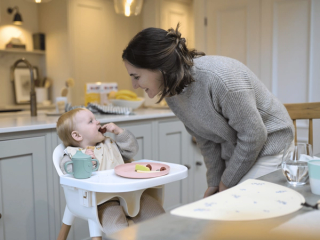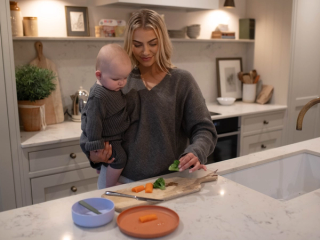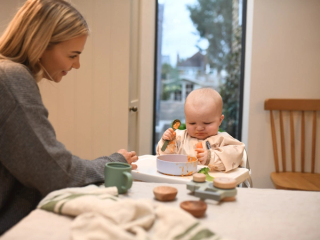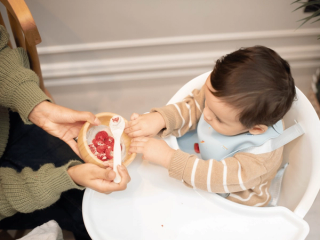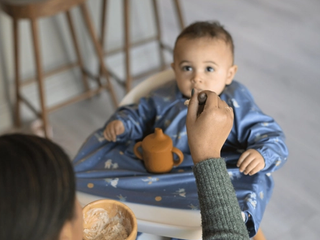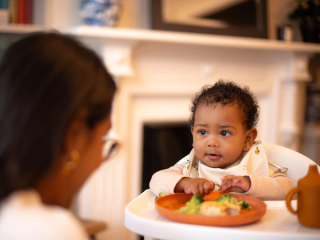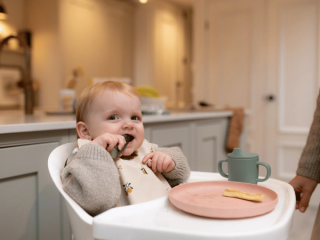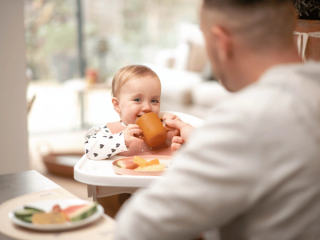
- Home
- Advice Hub
- Baby
- Weaning
- Common Weaning Myths
Common weaning myths
There are lots of myths about weaning - but are they true or false? Our Nutritionist, Helen, sets the record straight on some of the most common myths out there.
Weaning is easy!
Food before one is just for fun
Weaning onto solid foods will help my baby sleep through the night
If my baby is eating well, they don't need any vitamin supplements
Babies can’t have lumpy foods or finger foods until they have teeth
Babies need bland food and can’t manage spicy foods
Baby-led weaning is better than spoon-feeding
There are lots of myths about weaning floating around and it can make knowing how to approach weaning a bit tricky. We've asked our Nutritionist, Helen, to help demystify some of the common myths.
Weaning is easy!
Not necessarily – it may be a brand-new experience for you, and it is definitely a new one for your baby, so it might feel a bit overwhelming to start with, but it shouldn’t take too long before you both get the hang of it.
There is lots of advice available to help get you started and to guide you through the different stages of weaning. Whether you prepare all your own foods or buy commercial baby foods, or combine the two, there are plenty of choices to introduce lots of different tastes into your baby’s diet. The key to successful weaning is to relax, go at your baby’s pace and to have fun. If they don’t take to a new food straightaway, don’t worry, simply try it again another day.
Food before one is just for fun
Although introducing foods is something to enjoy, it is important to remember that there are nutritional and developmental reasons for weaning. From around 6 months, babies will start to need iron from a mixed diet to replenish their iron stores, which are usually depleted at this stage, and they need to start eating more energy-dense foods. Learning to enjoy lots of new tastes and different textures is also vital in their progress towards family-type meals, which they should be able to manage by the age of 1.
Weaning onto solid foods will help my baby sleep through the night
Giving your baby solid foods won’t necessarily make them sleep for longer. This should not be the reason for you to start weaning earlier than they are developmentally ready, nor should you overfeed them once they start weaning.
Look out for the signs that they may be ready for weaning. Babies only need a small amount of food to start with and as weaning progresses, let your baby guide you on the amount of foods they want. Look out for signals that they have had enough e.g. they keep their mouth shut, they turn their head away when you offer them food, they push away the spoon or bowl with food in it.
If my baby is eating well, they don't need any vitamin supplements
Even if your baby is eating a good balanced diet as well as their milk feeds, the current recommendation is that all babies from the age of 6 months to 5 years should have daily vitamin drops that contain 10 mcg vitamin D, A and C, unless your baby is formula-fed and is drinking more than 500ml formula a day, in which case they don’t need these additional vitamins. However, as their food intake increases and their formula intake drops to less than 500mls/day, you should start giving them vitamin drops too to safeguard against possible deficiencies.
Babies can’t have lumpy foods or finger foods until they have teeth
Babies should be able to handle these foods once they are 6-7 months, when they have lost their tongue-thrust reflex which forces foods straight back out of their mouths, and they are able to sit upright in a highchair. Your baby may not have teeth, but from 6 months they should be able to manage soft lumps and minced or mashed meals, so don't hold back when it comes to increasing textures.
Babies need bland food and can’t manage spicy foods
Your aim whilst weaning your baby should be to introduce them to a wide range of different flavours, possibly from a wide range of different cuisines, and you really don’t need to stick to bland flavours. You definitely shouldn't add salt to foods you’re cooking for your baby, but you can add extra flavour using spices and herbs. If you are using spices, keep these mild to start with and gradually increase the amount of spice used if your baby enjoys these flavours.
Baby-led weaning is better than spoon-feeding
In my opinion, if you want your baby to have the broadest exposure to various foods (and therefore nutrients), it is best to keep an open mind and use a flexible approach to weaning. There’s no right or wrong way to feed, and what your baby wants one day might be different to what they want the next. Let them show you which method of feeding they prefer, preparing the area well to allow for any mess. Offer your baby a selection of different finger foods as soon as they show an interest in these from the age of 6 months, but don’t be afraid to offer them foods from a spoon too, as long as you’re not feeding them against their will.
Advice & tips

Want to read more? Join the HiPP BabyClub for full access to this article.
As a BabyClub member, you'll get access to a range of exclusive benefits, including:
Monthly competitions
Discounts from our Partners
Expert advice tailored to your little one's age
Weaning recipes
HiPP shop discounts*
*10% off HiPP's online shop does not apply to our First Infant, Anti-Reflux or Comfort Formula Milk.
Important notice: Breastfeeding is best. Follow on milk should only be used as part of a mixed diet from 6 months. Talk to a healthcare professional.




